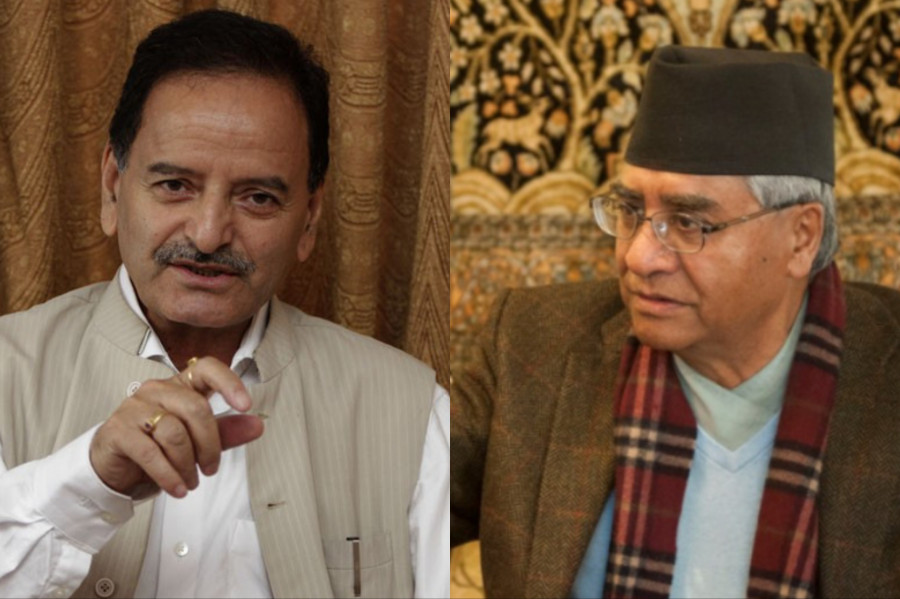Politics
Party rivals for strict vetting of candidates as Deuba wants Sitaula in upper house
The Koirala camp is opposed to fielding candidates who lost last parliamentary polls.
Anil Giri
The election for the National Assembly scheduled for January 25 will be another litmus test for Nepali Congress chief Sher Bahadur Deuba. As promised earlier, Deuba is almost prepared to field party leader Krishna Prasad Sitaula, who aspires to enter the upper house from the Koshi Province.
Twenty of the National Assembly’s total 59 seats fall vacant on March 3. One of the vacancies will be filled when President Ramchandra Paudel appoints a candidate on the Cabinet’s recommendation, while 19 others will come through elections.
From the Koshi province, a seat under the “others” category, and another reserved for “women” will fall vacant. And under the category of “ others”, two Congress leaders—Sitaula and Minendra Rijal—have emerged as strong contenders for one seat. Deuba wants to make Sitaula chairman of the upper house, while the rival camp led by Shekhar Koirala advocates for Rijal to be the national assembly chair. Since the party did not give a ticket to Rijal in the last parliamentary elections, the Koirala camp is vigorously pitching his name, according to the leaders close to Koirala.
However, there is a strong lobby in the party against Sitaula, who had helped Deuba win the party presidency during the 14th general convention in 2021.
“It seems Sitaula will be our candidate,” said Ramesh Lekhak, chief whip of the party, who is considered close to party president Deuba. “But the party is yet to decide who will contest the women’s seat in the Koshi province.”
Besides Sitaula, Deuba is likely to recommend the names of Gopal Man Shrestha, Ananda Dhungana, and Farmullah Mansoor, among others. The opposition camp says these tried and tested faces should not be sent to the upper house as the spirit of the National Assembly calls for those with expertise, special contributions in different sectors and those who have not had the opportunity in politics in the past.
But there is another undercurrent as well. The party’s anti-Deuba faction, which is led by senior leader Shekhar Koirala and supported by General Secretary Gagan Kumar Thapa and others, wants Minendra Rijal to contest for Koshi Province seat in the upper house as a successor to Ramesh Jung Rayamahji, who is also from the Congress.
Besides Rijal, as of now, the Koirala camp is also considering fielding Goma KC as the party. Nepali Congress to secure more than 10 upper house seats.
“Rijal is a far better candidate than Situala and well suited to be the National Assembly chairman,” said a leader close to Koirala.
As Sitaula and Rijal both represent the Koshi Province, the party has to pick one of them.
“This is the dilemma that Deuba, Koirala and the entire party face,” the leader said.
“As Sitaula lost the parliamentary elections to Rastriya Prajatantra Party Rajendra chief Rajendra Lingden, how can he join the upper house?”
But the rival faction led by Koirala and general secretary duo Gagan Kumar Thapa and Bishwa Prakash Sharma believes that the party should have a set criteria for candidate selections.
Accordingly, the general secretaries duo—Thapa and Sharma—are working to come up with such candidate selection, according to party leaders.
“We have told the party president and other senior leaders that Congress should not recommend to the upper house anyone who lost parliamentary elections,” said Jagadish Narsingh KC, adding, “fielding such candidates will undermine the spirit of the constitution.”
The party has called a meeting of its central working committee on December 28 to discuss the upper house elections and the upcoming Mahasamiti meeting.
The ruling coalition is all set to jointly contest the 19 upper house seats. While sharing seats among ruling partners, the largest party Congress is preparing to claim at least 10, a central working committee member said.
Deuba will hold negotiations with other ruling parties about the seats for the party, the leader said.
In the local, provincial and federal elections last year, the Congress had forged alliances with the CPN (Maoist Centre), the CPN (Unified Socialist), and the Janata Samajbadi Party.
The same coalition will likely remain intact during the Assembly polls next month.
The Congress has already issued a circular to forward the names of three candidates from each province to the party headquarters. The National Assembly members are elected by an electoral college. Each of the seven provinces elects eight members. The electoral college comprises members of the provincial assembly and chairperson/mayor and vice-chairperson/deputy mayor of local units in the province.
“As per the letter and spirit of the constitution, we should prefer candidates with low representation in law- and policymaking bodies. Besides them, we should pick those who have made significant contributions to the society, experts in different fields, and those who have contributed to the party’s cause but have not been given opportunities,” said KC. “This is not the place for individuals who have lost elections, served as ministers, or held other important portfolios.”
“We have told the party secretary to develop criteria and accordingly select candidates, giving opportunities to underrepresented groups,” said KC.
Ramhari Khatiwada echoes KC. “This sentiment is shared by almost all Congress leaders,” he said. “We have to fix criteria for candidate selection. The party leadership should internalise the aspirations of party leaders and cadres.”




 13.12°C Kathmandu
13.12°C Kathmandu














